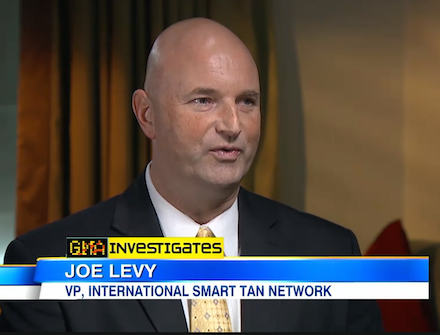‘Good Morning America’ Revisits Spray Tanning Safety

Dear Smart Tan Family —
ABC News Good Morning America produced a report last week about DHA spray tanning safety — concentrating on whether or not consumers understand that the FDA recommends that consumers take protective measures to avoid inhalation, ingestion or eye contact with DHA when using a spray product. Smart Tan’s Joseph Levy worked with producers and appeared on camera in the story, which greatly balanced the direction of the story.
We thought you should hear how Joe’s work over two weeks with the producers greatly influenced the direction of the story.
The story was a follow-up to a piece put together by a different production team at ABC three years ago. That 2012 piece was designed as an attack on the industry and totally missed the point: That the FDA “recommendation” for spray nose filters and eye protection is not a regulation, and that customers are well aware of the fact that over-the-counter department store spray products — still the majority of the DHA spray market — are sold without these protections.
The 2012 story also allowed a few interested parties to present older research about DHA safety out of context: The studies that questioned DHA safety were done on single cells exposed to much higher levels of DHA than any tanner would ever receive — which is why FDA has not created additional regulation for the spray market.
Levy worked with producers for last week’s story to make sure they understood those limitations clearly and that they understood the 2012 story was poorly produced journalistically. The crew admitted to us that the 2012 piece (whose producers are no longer with ABC) wasn’t executed fairly. So Joe agreed to work with them, and did a 60-minute on-camera interview in New York three weeks ago.
Joe sat down with ABC’s Paula Faris — who grew up in Jackson, Mich., while Joe was an investigative journalist in the same town from 1990-92. “Just like with discussion about UV exposure, we have nothing to hide here,” Levy says. “The key is knowing the science, what it says and doesn’t say, and having an opportunity to tell our story. The producers appreciated that, given how poorly we were treated by a different crew three years ago, we were willing to work them for this piece.”
Levy brought along department store spray product, and showed Faris how it is sold without any protections. One major department-store spray product recommends spraying DHA into your hand and then wiping it on your face — as if anyone who understands DHA would spray it into their hand. Another major brand has no instructions at all on its label.
We were not surprised — that didn’t make it into the story. But the producers are well aware we understand ABC receives ten-of-millions-of-dollars in advertising from those companies, and that their coverage of DHA should extend to those suppliers. Levy also pointed out that over-the-counter spray sunscreen products are promoted by doctors — even lung specialists — to be used to spray directly into users faces as long as they close their eyes and hold their breath. Further, hairspray and air freshener are used in a similar fashion.
When asked whose job it is to protect the consumer, Levy pointed out that the U.S. Centers for Disease Control links hours spent watching TV with childhood obesity and that ABC does not limit nor recommend a limit of time its clients should “use” their product.
“This point was made in context – it was neither sarcastic nor attempting to make any point of equivalency, but the point was well taken,” Levy said. “Ultimately, they could not debate that it is the consumer’s responsibility to make the right decisions, but that the industry had done a great job of getting the information out that nose and eye protection are available in the last three years and that, of course, the consumer is getting mixed signals from external sources outside our market on whether or not those protections are even necessary.”
Smart Tan and major spray-tanning manufacturers all agree that salons should advise clients that FDA recommends the usage of nose protection and eye protection while being sprayed, and that protective gear should be available for tanners in the salon. Since the 2012 piece ran Smart Tan and the industry’s major manufacturers have distributed material to every tanning facility on the FDA recommendations. The manufacturers also have made nose and eye protection widely available.
• Click here to see Sunless Inc.’s DHA advisory sign
• Click here to see Norvell’s DHA advisory sign
• Click here to see Smart Tan’s DHA Advisory
Thanks for reading,
Your Smart Tan Team
